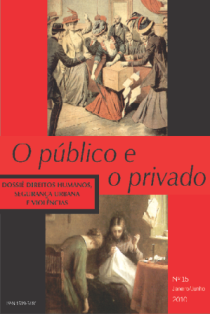Policies for juvenile offenders in Uruguay
social and institutional trends based on the role of the judiciary, police and the press
Keywords:
Social conflict, Youth, Media, Standardization InstitutionsAbstract
Uruguay has gone a long way in terms of childhood and youth policies. From a model of social integration in which the State assumed a role of care and protection, the turn of the 70s determined a change in the general orientation. At the state level, various movements promote the adoption of the Code of Children and Adolescents in 2004 whose orientation responds to the provisions of the Convention on the Rights of the Child. The changes implemented, however, do not alter the increase in punitive tendencies in childhood and adolescence. Integrating the perspective of conflict and violence in the analysis of the Judiciary, the Ministry of Interior and the written press investigates the interrelations that lead to the consolidation of this trend. The acceptance of punitive and repressive discourse is key in the future reorientation of youth and citizen security policies. The work against the naturalization of fear of the other (young, poor, infringing), is related to processes whose object is a representation of society, guilt, justice and exclusion that has effects on punitive practices.











